Q&A with Elisa Foster, New Director of Penn Women’s Center
Congratulations on your promotion to Director of Penn Women’s Center. What does it mean to be the new Director of Penn Women’s Center (PWC)?
It means so much. I’ve been working at the Women’s Center for almost six years. With the relationships that I’ve developed with students and colleagues, it means a lot that I can lead Penn Women’s Center into the future as we celebrate our 50th anniversary. I want to take the relationships and important memories that I’ve made during the last six years and amplify them to the next level.
Tell me a little bit about your background and how you got to Penn.
I started out working in the nonprofit industry doing grant writing and strategic planning for organizations in Philly. I was a consultant working with a few organizations locally. Then I moved into market research, which was an interesting move, but it all kind of tied together because a lot of the clients I was working with were nonprofits and educational institutions. At the time, I was also working on my master’s degree in communication studying media representation of women and black communities Nonprofit consulting piqued my interest in higher education because I was working with a lot of universities on how to best meet the needs of their constituents, which has always been a focus of my work. I was doing projects for schools like Penn State and Lutheran Theological Seminary, thinking about how best to meet the needs of their students and their faculty. As I was contemplating my next career move, I ended up finding a position at Robert Morris University in Pittsburgh.
What role did you have at Robert Morris?
Robert Morris was starting a Women’s Leadership and Mentoring Program, and I was the program manager. It began with me and the faculty director, starting this program from scratch. It was an important initiative for the University because, unlike most colleges, Robert Morris has fewer women students than male students.
It is because Robert Morris was traditionally a business school, right?
Exactly. They created this great mentoring and leadership program to encourage more women applicants and to create supportive connections among women students, faculty, and alumni. I worked there for three years, and then Philly pulled me back. In 2017, I saw the opening for an Associate Director position at Penn Women’s Center and said, ‘Oh, that’s perfect,’ because it marries my work supporting women and addressing issues around gender equity. The role at PWC positioned me to do the work on a broader scale, reaching areas of campus and the community that I did not have access to at Robert Morris. I love that PWC is a confidential resource; offering that kind of support to people in our community is important.
As one of the oldest women’s centers in the country, what does it mean, for both Penn and PWC, to celebrate the 50th anniversary?
It’s interesting because of this moment in time where women and people who identify as gender minorities have made leaps and bounds of progress. People are intentionally making more inclusive spaces. Women are excelling in areas where they were previously underrepresented. But, at the same time, we’re still dealing with a lot of the issues that were present 50 years ago. For example, the reversal of Roe v. Wade, which we should have been acknowledging the 50th anniversary of this year, is something that I think a lot about. We thought we were further ahead with issues around reproductive justice. It feels like we are taken right back to 1973. It’s been interesting to reflect on how far we’ve come but how much more work we must do.
What is the history of the PWC? Who founded it? Why was it established back in 1973?
The Penn Women’s Center was a result of student, faculty, and staff activism right here at Penn. There were a series of sexual assaults happening on campus. Women didn’t feel safe where they were receiving their education, where they were teaching, where they were working. In the Spring of ‘73, there was a sit-in at the President’s Office, and they had a list of demands. One of those demands was a Women’s Center that can offer resources to students. One of the other demands was a Women’s Studies Program, which is now the Gender, Sexuality, and Women’s Studies program. Another demand that has had a lasting impact was the creation of the Department of Special Services, housed in the Division of Public Safety. Penn Women’s Center started out as an administrator in an office, and we’ve grown. In 1996, we moved into the house here on Locust Walk. Since then, we’ve been able to add to expand the resources and provide support to student groups.
Can you reflect on how PWC’s role on campus has changed over the past 50 years?
A big part of what we have done in the last few decades has centered on gender equity, and inclusion of all gender identities. We want to make sure that, regardless of who you are, you know that you come into the Women’s Center and receive care and support. That’s one thing that’s been really important! Especially including and uplifting our trans and nonbinary communities. We also continually work to bring in communities of color, who historically have felt isolated from women’s movements throughout history to make sure that everyone has a place here, and they can receive support. We’re called the Women’s Center, and that has always been central to the empowerment and upliftment of women. But we also want to make sure that Gender Equity is at the foundation of what we do, and that our approach is intersectional.
What are some of the traditional programs and services that you provide at PWC?
One thing that has been consistent is that PWC is a confidential resource for students, staff, and faculty. Most often, that applies to people who experienced sexual violence and/or who experienced gender-based discrimination. But it also expands to a myriad of interpersonal situations: advising around conflicts with friends and classmates; dealing with health issues; trying to figure out where to go, what their next step is, what resources are on campus — we call it Options Counseling. We don’t provide counseling in the traditional therapeutic sense. We’re here to listen, validate an experience, answer questions, and then lay out the options that exist on- and off-campus to address whatever challenge or concern one may have. We’ve always worked with student groups and student organizations. We’ve worked with many groups throughout the years who need advising support, or just need mentorship or a home base on campus. We’ve been involved in a lot of the conversations around representation on Locust Walk and making sure that students of marginalized identities have a space to feel safe in the middle of campus. PWC is very privileged and fortunate to have this house, right in the middle of everything, but I know everyone doesn’t have that. We offer space to communities and student groups to support their needs, advocate for issues they feel are important, and open our doors to anyone who needs a safe space on campus – whether it’s to talk to a staff member in a confidential setting, attend a wellness program, or nap on the living room couch in between classes.
What has been planned for PWC’s 50th anniversary celebration?
We’re still in the early stages of planning. First, we are going into our archives and updating the records because during the 40th anniversary, we did an archive display and we now have another decade of programs and accomplishments to add. We’re working with University Life’s Strategic Planning & Operations team to digitize PWC’s archival records. We’ve been working with our student team to get everything organized. The archive project will be important because it will highlight the timeline of Penn Women’s Center’s origins, beginning with photos and Daily Pennsylvanian articles. It will also highlight everything that’s happened and evolved over the past 50 years. For the 40th anniversary, we also started a video project called the Voices of Change. We’ll be doing some more of that oral history work to make sure the voices of PWC’s community are captured. We will kick off the celebrations with a program during Homecoming this fall. We will also co-sponsor a symposium organized by Gender, Sexuality, and Women’s Studies in Spring ‘24 to celebrate both of our 50th anniversaries.
That sounds so exciting. As you enter the Directorship, what are some of the challenges that PWC faces? What are some of the expectations that you have moving forward?
A lot of universities are contemplating the same questions as they imagine the future of their women’s centers. Some centers have changed their names, transitioned into centers for gender equity, and some have combined with their institution’s LGBTQ+ center. As director, I want to determine what the next best step is for PWC at Penn. I want to listen to and engage with our community and figure out what that means. I look forward to doing a listening tour and focus groups, having conversations with our students, alumni, staff, and faculty. We want to make sure we’re acknowledging the experience of people who have been coming to the center for many decades, but we also must ensure that we’re meeting the current needs of our students and figuring out what that balance looks like for a Women’s Center at this particular point in time. I’m excited to embark on this journey but it’s a very difficult question and challenge to solve. That’s what I am most excited for. On top of that, I am excited to continue building our collaborations with students and many campus partners like Penn Association for Gender Equity, Wellness, Penn Violence Prevention and our fellow Cultural Resource Centers.
Penn Women’s Center Supports Black Girls Literacy Project
Sophia Parker looked at the array of photos of Black women in front of her, thinking carefully. The 16-year-old from North Philly picked up one of a middle-aged woman dressed to impress, and another of a younger woman with her family. Parker then told the other girls participating in the Black Girl Literacies Project last fall why she was drawn to those images, she recalled.
“When I get older, I want to see myself being a classy woman with my pearls and just being happy with life, knowing that I succeeded in some type of way,” she said. “One day, I would like to have a family and see [them] grow and be successful.”
The other girls did the same that day, using the photos to talk about how they saw themselves and what they wanted out of life. It was a different kind of practice than Parker had ever heard of, but over the course of several weeks in the program, she came to understand herself better.
“It gave me a new outlook on ways to love myself,” she said.
“Black girlhood really focuses on celebrating the humanity of folks in ways that schools don’t often honor.”
Barrett Rosser
The Black Girl Literacies Project is a free program for Black girls in Philadelphia, where participants explore different ways of loving themselves. Registration is open for the project’s Spring cohort, which begins on Feb. 15 and meets every other week. The program is for Black Philadelphia girls ages 14 to 18, and meets at the Penn Women’s Center, but also holds additional sessions at places such as the Colored Girls Museum in Germantown.
Barrett Rosser, the creator of BGLP, is a doctoral student at the University of Pennsylvania after previously working as a Philadelphia school teacher for over 10 years. She started the project in 2020 as part of her doctoral dissertation. “[Black girls] sit at the intersection of racial and gender [oppression],” she said, explaining why it is essential for Black girls and women to practice self-love.
New Penn Violence Prevention Director Talks to the DP About Working Towards the Greater Good
Two months into her tenure, newly appointed Penn Violence Prevention Director Elise Scioscia spoke to The Daily Pennsylvanian about her goals.
Scioscia, who began her tenure on Dec. 7, was selected for the position after a nearly year-long nationwide search prompted by the departure of former Director Malik Washington in January 2022. PVP serves as Penn’s primary resource for students experiencing interpersonal violence, including sexual violence, relationship violence, stalking, and sexual harassment.
Prior to coming to Penn, Scioscia served for 11 years at Women Against Abuse, Pennsylvania’s largest provider of services for people experiencing domestic violence, where she undertook extensive responsibilities from organizational strategic planning, operational management, public policy to prevention education work.
Scioscia told the DP that her major goal at PVP is to leverage the abundant resources available at Penn to “deepen the work in primary prevention and starting and stopping violence before it happens altogether.”
Penn’s Approach to a “Career Everywhere” Model
Filmed at the annual National Association of Colleges & Employers (National Association of Colleges & Employers) conference, Michael DeAngelis, Senior Digital Resources Manager & Co-Host of CS Radio, shares Career Services’ philosophy of Career Everywhere.
Student Spotlight: Chris Raboy, Chief Executive Officer for Penn Student Agencies
During the Fall ’22 semester, I met up with Chris Raboy, formerly the Marketing Director for Penn Student Agencies (PSA) and now currently serving as the Chief Executive Officer. Apart from the funny bits about juicy tomato costumes and the debate over which cafe is best, our conversation was enlightening. I’m glad I was able to talk to him about, among other things, his time at PSA, a very interesting organization here at Penn that allows students to create and run their own businesses.
As a nursing student, Chris has no background in marketing, networking, or website building. So how did he become the Marketing Director for PSA and eventually, the Chief Executive Officer? Chris applied for the Executive Director position of First Services, sadly he did not get the job. But luckily his supervisors saw something in him. They saw that he was passionate about the job and offered him the Marketing Director position for Penn Student Agencies during. This meant he had to learn how to market these businesses, how to build websites, and how to network. How did he manage this? Email. Chris asked for help, he emailed everyone he could, asked 100 questions, he experimented, and saw first-hand what worked and what didn’t. By persevering Chris was not only able to do his job efficiently, he also learned a lot of skills he uses for his personal and professional goals. Additionally he was able to find mentors that would be instrumental in not only guiding him but PSA as a whole. Similarly, that perseverance allowed Chris to promote his own passions. Currently he has his own website and social media platforms in which he promotes fitness and wellness. As for PSA, he is currently working along with the team to establish continuity within the organization and develop new businesses.
Chris is one of those people who you look up to, partly because he actually goes to the gym and can maintain that routine, but also because he is proof that one can achieve anything. The only condition is that one must not be afraid to try, to fail and to ask for help. As I’m writing this I am reminded of this popular phrase that says “El que tenga miedo a morir que no nazca”. It translates to “whoever is afraid of dying, don’t start living”. It’s mostly satirical, but there is a message behind it, if you’re afraid of failure you will never succeed. That’s why I implore anyone to take a page from Chris’ book. Try, send a thousand emails, and ask a million questions. Learn from your failures instead of letting them define you, and most importantly never give in to self-doubt.
Introduce yourself:
My name is Chris Raboy. I’m a sophomore in the School of Nursing studying nursing and nutrition. I am currently working at Penn Student Agencies as the Chief Executive Officer, previously the Marketing Director, and I recently began working as a fellow at Venture Labs at a startup.
What are your hobbies?
I enjoy working out, and I am very interested in preventative medicine through nutrition and exercise. Additionally, I enjoy movies, specifically psychological thrillers, as well as dancing, going out with friends, and having a good time.
What’s your favorite psychological thriller?
My favorites are usually those movies with a crazy last-minute twist like Shutter Island. Anything IMDB 7 or higher is usually pretty good.
I saw that you have a website, why did you choose to make one and what would you want other people to know about it?
Making a website actually came from my experience at PSA. PSA’s department recently transitioned everything to WordPress which meant that everything in regards to the websites had to be redesigned. My administrator at the time Kelly Hartman asked me to take a look and see what I could do with it. I started looking at it and realized that I was unfamiliar with a lot of things so I decided to educate myself. I watched a lot of YouTube videos and asked a lot of questions. I would try, mess up, and ask questions. It’s funny because I’m known as the guy who sends a lot of emails and asks 100 questions, but I think that’s the best way to learn. That process of trial and error taught me that website building is not as hard as I thought it would be. From that experience, I thought why don’t I build my own website. I used everything I learned from PSA, kept asking questions, and over the summer I created my own website. That helped me build a skill set that I could use not only for my website but for other things that could contribute to PSA.
What’s your favorite video you’ve made on your social media?
My favorite video was when I challenged myself to do a 1,000 squats. Sometimes I feel like things get too monotonous so I try to switch it up. The challenges seem like a good idea at first but very quickly you realize that it’s not as easy as you thought. However, no matter how hard it is, I always force myself to see it through.
What’s your favorite workout? Any tips?
My favorite exercise is squats. It’s such a functional exercise, a lot of people run and do a lot of leg exercises, but simple squats can make you very strong.
Finally, what was your Halloween costume this year?
This year I dressed as a juicy tomato. I ordered it on Amazon and it was great.
Penn Student Agencies
What are Penn Student Agencies? What do they do? What is their mission
Penn Student Agencies is a collection of student-run businesses on campus at the University of Pennsylvania. There were originally 10 businesses. Due to the pandemic we had to shut down, not entirely in terms of the businesses, but the university as a whole. As of recently, we have been absorbing some businesses together to centralize some processes and help establish continuity between each of the businesses. We are focusing on establishing continuity because some of the processes have been lost since a lot of people graduated and we want the processes to stay in place even if people graduate. Our mission is to teach transferable skills and business management to Penn students by providing hands-on entrepreneurial opportunities to make them competitive in the workplace environment. People who graduate from Penn that have worked in PSA get a jump start into business in the US or internationally. PSA is also good because we have a wide range of opportunities from retail, hospitality, and creative design.
Outside of on campus, we are also part of the Student Run Business Association which is an intercollegiate organization that hosts conferences to discuss different operations and provide networking opportunities for students.
Very recently you were promoted to Chief Executive Officer of PSA. Congratulations! Can you share what this promotion means to you and what your vision for PSA is headed into the Spring ’23?
As a Nursing and Nutrition student, PSA has proved to be a vital resource not only for my continued professional development but for my academic studies as well. I have not had any exposure to business prior to working as the Chief Marketing Officer (CMO). My time spent working over the summer and into the school year as CMO made me increasingly passionate about the program and providing students with entrepreneurial opportunities outside the classroom. I wanted to be an integral part of PSA’s future growth and development.
The promotion to Chief Executive Officer (CEO) allows me to be at the forefront of furthering PSA’s mission, vision, and growth while also increasing my knowledge to gain a comprehensive view of business and employee management skills.
As PSA heads into Spring 23’ I envision the expansion of our organization’s presence on/off campus for students, the local community, and alumni; the development of a community with on and off-campus networks ranging from clubs, departments, local businesses, and Student-Run Business Organizations; and a restoration of continuity that PSA has had in the past through an all-new management board training program.
Tell us about your role as Marketing Director before being promoted to Chief Executive Officer.
I served as the Marketing Director prior to starting my new role. I actually applied for the Executive Director of First Services position but I did not get the job. Instead, they offered me the Marketing Director position in the Spring ’22 position since they liked some of my ideas and saw that I was passionate about the job.
As the Marketing Director, I was responsible for the entire marketing portfolio for PSA businesses. This means that I work in the marketing of each individual business, whether that means recruiting, inter-departmental relations, newsletters, events, list serves, I try to get PSA involved.
How would you describe your experience running the marketing for these businesses?
Very exciting. Over the summer with everything, with learning how to build the website, branding, meeting with people to talk about future plans for PSA, I learned a lot. I learned the psychology behind marketing, how to catch people’s attention, and also how to market yourself. By doing this I’ve been able to get PSA out there.
What is your favorite part of working at PSA?
The people and the experience. My administrators and my program manager are amazing. I’m very grateful that they took a chance on me and for their unbelievable support. They helped me navigate this job and stay motivated to keep making PSA better. As for the experience, it’s unmatched. I’ve learnt so much, marketing, communication skills, website building and so many other things.
What have you learned from this experience?
Time management. I’m taking 5.5 credits so scheduling is very important in order to keep up with classes and my job. I feel like it makes me more efficient because if I know that’s the only time I have available to get a particular thing done, I can focus solely on that task. Additionally, scheduling blocks of time for certain things helps me get organized and find more time to work, find fellowships and in general pursue more things.
Do you have a favorite business? If so, let’s put your marketing to the test! In one minute, promote your favorite business. Tell Penn students why they should go to that business.
Williams Cafe: coffee, bagels, pastries. Best prices on campus, located in the language building 2nd floor. At Williams Cafe you may hear Penn Records who occasionally play on Fridays, and you can get a nice warm espresso.
A Renewed Vision for Penn Student Agencies
Penn Student Agencies thrived on continuity as one of the oldest student organizations at the University of Pennsylvania. Each graduating class passed the baton to the next generation of entrepreneurs, creatives, and business-minded students.
When the pandemic shuttered most of its student-run organizations into a virtual state, it disrupted the clockwork transfer of skills that kept PSA in business for 89 years. The handed-down experience of running a business and knowing the ins-and-outs from a financial, operational, and community perspective was all but lost. Without the training from students with experience, current PSA students missed the baton and were left putting puzzle pieces together from scratch.
The expertise was retained by PSA alumni. Naturally, the first place they looked to revive the organization was with one of its own.
Michael Paul Warren ‘20/‘21 took over as the Program Manager at Penn Student Agencies in September ‘22. The former PSA Executive Vice President of Operations 2018-2020, now titled PSA Chief Operating Officer, looks to reinvigorate PSA back to its pre-pandemic state and reimagine the organization to better meet the needs of Penn students.
“The pandemic showed us the importance of resilience, both for organizations and individual student leaders. That resilience is what made Penn Student Agencies what they are now. We have a foundation to continue building from the pandemic.”
At its heart, PSA is student-run. It is comprised of four organizational clusters: central corporate, creative services, dining and hospitality, and retail and delivery divisions. Within that, there are currently seven PSA enterprises, consisting of firstServices, Penn Student Design, Penn Lens, Special Deliveries, Penn Closet, Williams Café, and Benny’s Diner. It aims to teach transferable business skills to Penn students through hands-on experience outside of the classroom.
As a student, Michael oversaw many of PSA’s human resource functions, organizational effectiveness, and the compliance policies and procedures of the businesses. He and fellow PSA director Jazzy Ortega ‘20 created a proposal to start a quick-service, all-day breakfast restaurant that became Benny’s Diner in Houston Hall.
PSA changed the course of Warren’s career ambitions. He entered Penn as a pre-med student. When he joined PSA, he gained an appreciation for interpersonal relationships. He wanted to learn the dynamics of people working collectively in groups. The experience led him to graduate with a Bachelor of Arts in Sociology with a concentration in Law in Society from the College of Arts and Sciences.
“I really loved understanding process design and process optimization — how different policies, laws, and structures are set up based on how humans interact with each other. PSA led me down a career path more on the operations and instructional design side of things. In business, I’ve always enjoyed the ambiguity that came with the startup environment and entrepreneurship.”
A PSA Homecoming
Warren graduated from Penn shortly after the COVID-19 pandemic started. He moved to New York City to work in client services serving private equity firms, but quickly shifted back to the entrepreneurial space. Michael helped lead the build out of the global logistics team at a unicorn e-commerce startup based in New York that specialized in consumer goods. Launching in February 2022, he was one of the original team members, and oversaw global inventory movements and relationships on the end-to-end supply chain.
Michael maintained his involvement to PSA as an advisor. He was appointed as co-president of the Student-Run Business Association in 2022 after serving as a Vice President and on the Board of Directors since 2019. He continued to cultivate different relationships at universities throughout the country.
Meanwhile, back in Philadelphia, Penn student Chris Raboy ‘25 was looking for advice on how PSA operated outside of a COVID context. Upon researching pre-pandemic PSA documents and websites, Raboy reached out to several alumni hoping to discover historical information that would improve his ability to reignite the program post-pandemic. He messaged Warren via LinkedIn, and the two stayed in touch after Raboy took over as the Chief Marketing Officer. When the full-time Program Manager position became available, Raboy immediately thought of Michael. The ideal candidate was someone familiar with PSA, who could create continuity, guide PSA post-pandemic, and help grow the program in an increasingly digital world.
“From our first meeting, I was awed by what I was seeing: structure and efficiency,” said Raboy, who is PSA’s Chief Executive Officer for 2023-24. “I realized that I had to change the ways I was organizing materials, communicating, and the importance of the first impressions. He gave insight into a ton of the strategies I ended up utilizing throughout the summer.”
Warren’s interests in operations and organizational dynamics enable him to expand upon a network of institutions and nonprofits that run similar programs. For example, the business proposal for Benny’s Diner was inspired by student-run food service ventures presented at the 2019 Student-Run Business Association conference in Cambridge, Massachusetts.
“I’m bringing the knowledge of what it was like operating in a pre-pandemic world, the challenges that we faced when I was a student and the challenges that the students before me had encountered. I can share that knowledge and bridge the connections between young alumni and the current students.”
The biggest hurdle for PSA students is navigating the people element of business and entrepreneurism. A lot of businesses that were “heavy on in-person interaction had to alter those interactions to be able to operate virtually or digitally.” As organizations become more focused on e-commerce, the student-run businesses need to understand how to keep their staff engaged and ensure positions are appropriately filled.
PSA’s focus for the 2022-23 academic year and beyond is setting up that continuity between leadership, turnover, and new students joining the organization. Warren looks to recreate the consistency that allowed PSA to thrive and replicate a consistent experience on a yearly basis, allowing Penn students to build off what individuals accomplished before them.
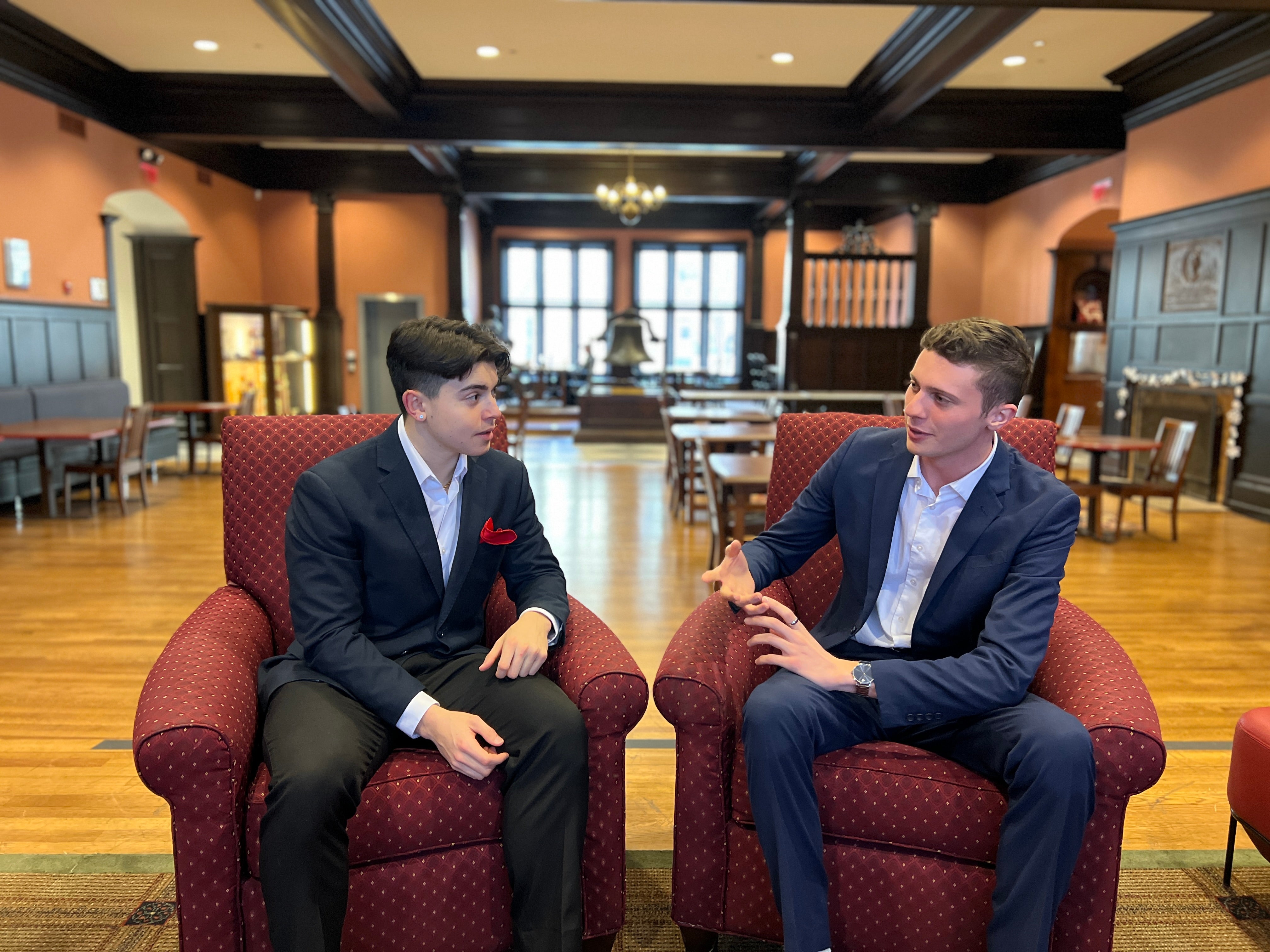
From our first meeting, I was awed by what I was seeing: structure and efficiency. I realized that I had to change the ways I was organizing materials, communicating, and the importance of the first impressions.
Chris Raboy
PSA’s Chief Executive Officer
Building A Bridge With Alumni
Warren has noticed a renewed interest in PSA alumni. He said that there is an extensive number of Penn graduates from multiple generations that want PSA to succeed and bounce back from the pandemic. One of Warren’s biggest pushes is to establish an alumni network. There is an “untapped potential” of interested and influential grads that can serve as a significant resource for PSA students.
Because PSA is not tied to any undergraduate or graduate school, one of the advantages that it offers is a wide array of perspectives. Warren said that its leadership and general body consists of a substantial cross-section of different academic disciplines.
“It’s a great opportunity for students to showcase their mindset and how they approach thinking. A nursing student isn’t going to approach the problem the same way a Wharton or an engineering student would. Putting them together on the same team and having them brainstorm and navigate the ambiguity that is the startup environment allows them to come up with these creative and interesting solutions to problems.”
A large part of learning for the students in PSA is supported through the introduction of frameworks that help distill large complex problems into more manageable concepts.
“For many students this is the first time they are taking on considerable responsibility and decision making. Understanding the impact of those decisions can be difficult with limited experience – which brings us to a framework I use with the students – FORTS.
“FORTS stands for financial impact, operational impact, reputational impact, team impact, and strategic impact. This framework helps student leaders understand what the implications of their decisions may or will have on various aspects of their business and help create a figurative mental fort around their decision making.”
Heading into its 90th anniversary, PSA has always been financially self-sufficient, the money that they make goes back into the programs and students. First known as Self-Supporting Students, PSA began in 1933 as part of the New Deal’s National Youth Administration, an early model of what is now the Federal Work-Study Program. It started as three student-run businesses: Dorm Laundry Agency, Parking Squad, and Trunk Moving Squad. Under the name of Associated Student Agencies, it grew to more than 10 businesses in the 1950s, including Coat Checking at the Palestra, Railway Express, and a birthday cake shop. PSA students worked at Pennsylvania’s central control point to call in vote tallies during the 1964 presidential election. Adopting its current name in 1975, the organization has since adopted several ventures to its portfolio including apparel manufacturing, tourism guide publications, newspapers, and a bartending school.
There have been a few success stories, such as Penn Closet, that have prevailed with continued interest in the student body after the organization’s founders graduated. Some alumni have gone out and become entrepreneurs on their own by starting competing businesses. It has created unique experiences for students to compete with one of their former colleagues.
Its alumni have each gone off to their own different paths, whether it is med school, law school, or serial entrepreneurism. Warren said, “the nice thing about PSA is that you have students who join for different reasons and get different values from it.”
As a professional and an alumnus, Warren views his role as a coach and a mentor. Sticking to the organization’s for-students mantra, he offers students the freedom to conduct day-to-day operations, think through business decisions, and determine whether they made the correct choices.
“PSA fosters that environment where you have the support, you have the resources, and it’s up to the students to decide how they use them. Providing them direction, giving them experience, allowing them to manage teams before even going out in the corporate world gives them a lot of different exposure and experience that they wouldn’t have had if they were simply taking a class.”
Historically each graduating class in PSA is between 30-50 students each year. Currently, PSA retains a database of 600-plus alumni ranging from the class of 2022 all the way back to some as early as 1955. PSA is looking to grow this network!
University Life Represented at ’22 AFA Conference
Jessica Ryan, Director for Leadership Community in the Office of Fraternity & Sorority Life at the University of Pennsylvania was awarded the Shelley Sutherland Outstanding Volunteer Award at the ’22 Association of Fraternity / Sorority Advisors Annual Conference.
The Shelley Sutherland Outstanding Volunteer Award was established in 2003 and re-named for Shelley Sutherland upon her retirement in 2011. The purpose is to annually recognize outstanding volunteer service by an association member in an official AFA volunteer role. The individual has devoted significant time and energy supporting association initiatives or efforts through their volunteer role. They are consistent and reliable, communicative, and committed to the values and mission of the association as demonstrated through their service.
Ryan shared her excitement about attending the conference and receiving the award; “What an amazing experience! Thank you to the Association of Fraternity & Sorority Advisors for letting me chair the Educational Programs for the Annual Meeting Planning Team these last two years, and serve in volunteer roles with the association for the last decade. Truly a goal accomplished and amazing experience. Thankful to be recognized for volunteering with the association.”
The Clothing Closet
Button downs, black leather jackets, summer jumpers, and stacks of sweatshirts were neatly folded, stacked organized into sections in a meeting room in the LGBT Center, ready for the Center’s inaugural Clothing Swap & Drop. The event, kicked off the new Clothing Closet, which will be a permanent community resource.
Housed in the LGBT Center’s lounge area, the closet will be open to the public starting on Nov. 28 on Mondays and Fridays from 11 a.m. to 4 p.m. and 6 to 9 p.m. on Tuesdays. Students, faculty, staff, and community members are welcome to drop off used, freshly laundered clothing or peruse the racks to take a new outfit home.
The Clothing Closet is presented in partnership with Wellness at Penn, which commissioned canvas bags and notecards reminding closet patrons to “wash before you drop and after you swap,” all designed by Wellness’ student interns.
Julia Mills Burton, a nurse practitioner and gynecology section chief at Wellness at Penn’s Student Health and Counseling division, serves as the chair of Wellness’ LGBTQ working group. Students told her they needed more access to affordable clothing, Burton says. “Sometimes there are financial hardships, particularly as people are going through gender transition,” she says. This program will “provide opportunities for them to have access to clothing that might be gender affirming for them.”
Jake Muscato, the Center’s new associate director, and Wes Alvers, a master’s student at the School of Social Policy & Practice and the Center’s social work intern, worked together to set up the space.
4th Class Midshipmen Leadership Lessons
4th Class Midshipmen and active duty staff from the University of Pennsylvania and Villanova University Naval ROTC units took part in an overnight retreat to Outdoor Odyssey in western Pennsylvania. Outdoor Odyssey is a camp founded by retired Marine Corps General T.S. Jones that includes adventurous activities paired with leadership and team-building lessons that transfer to everyday life.
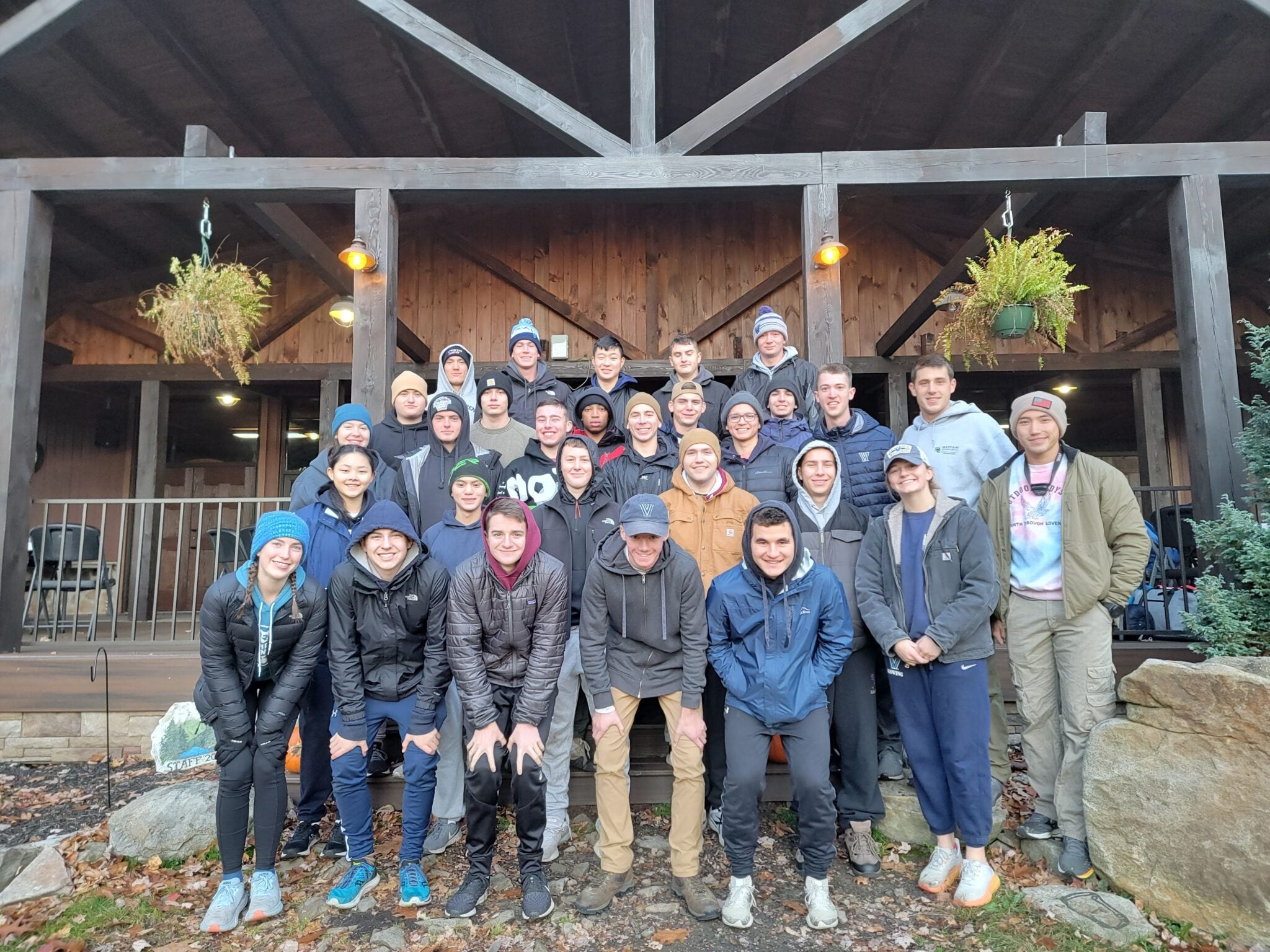
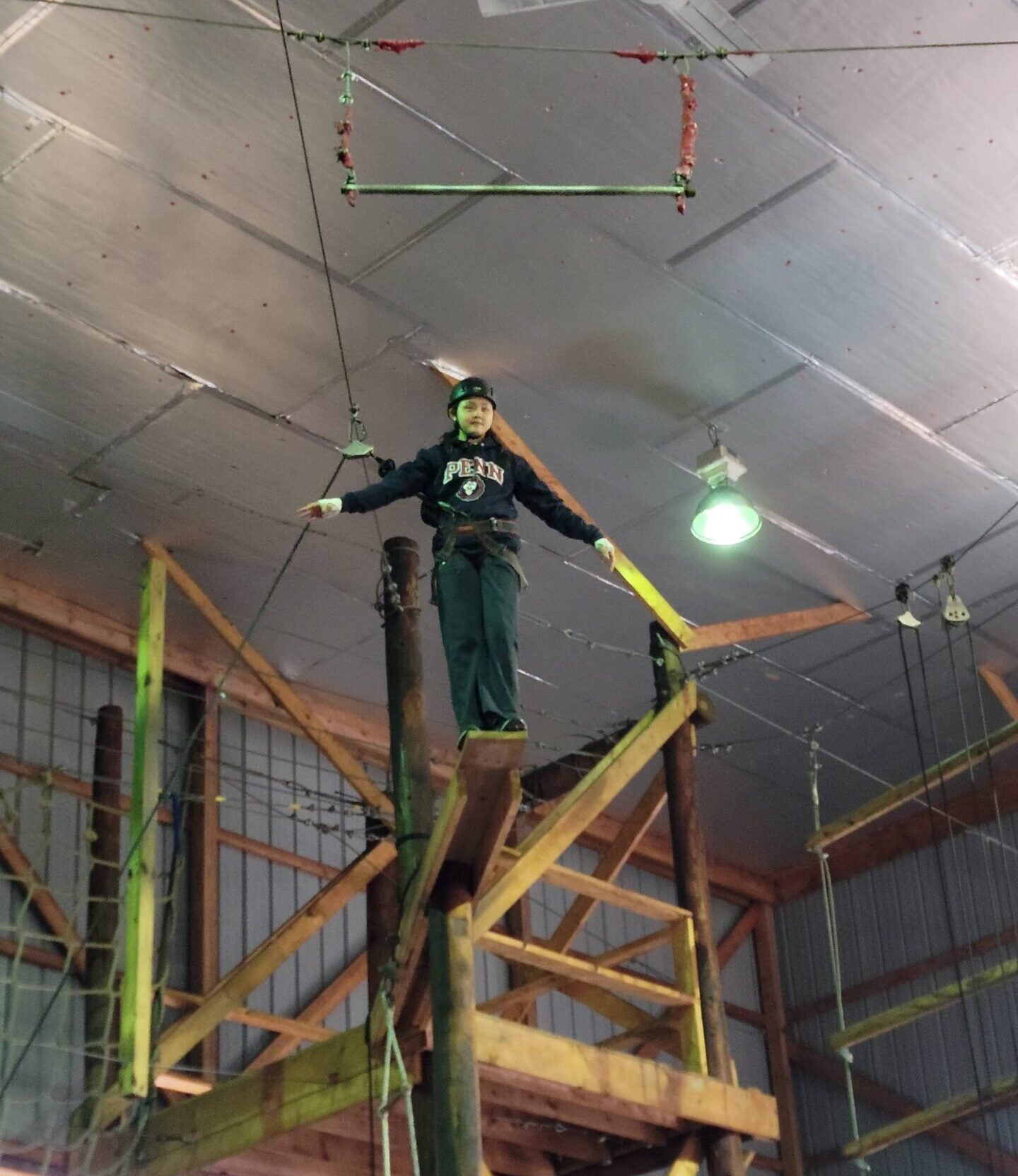
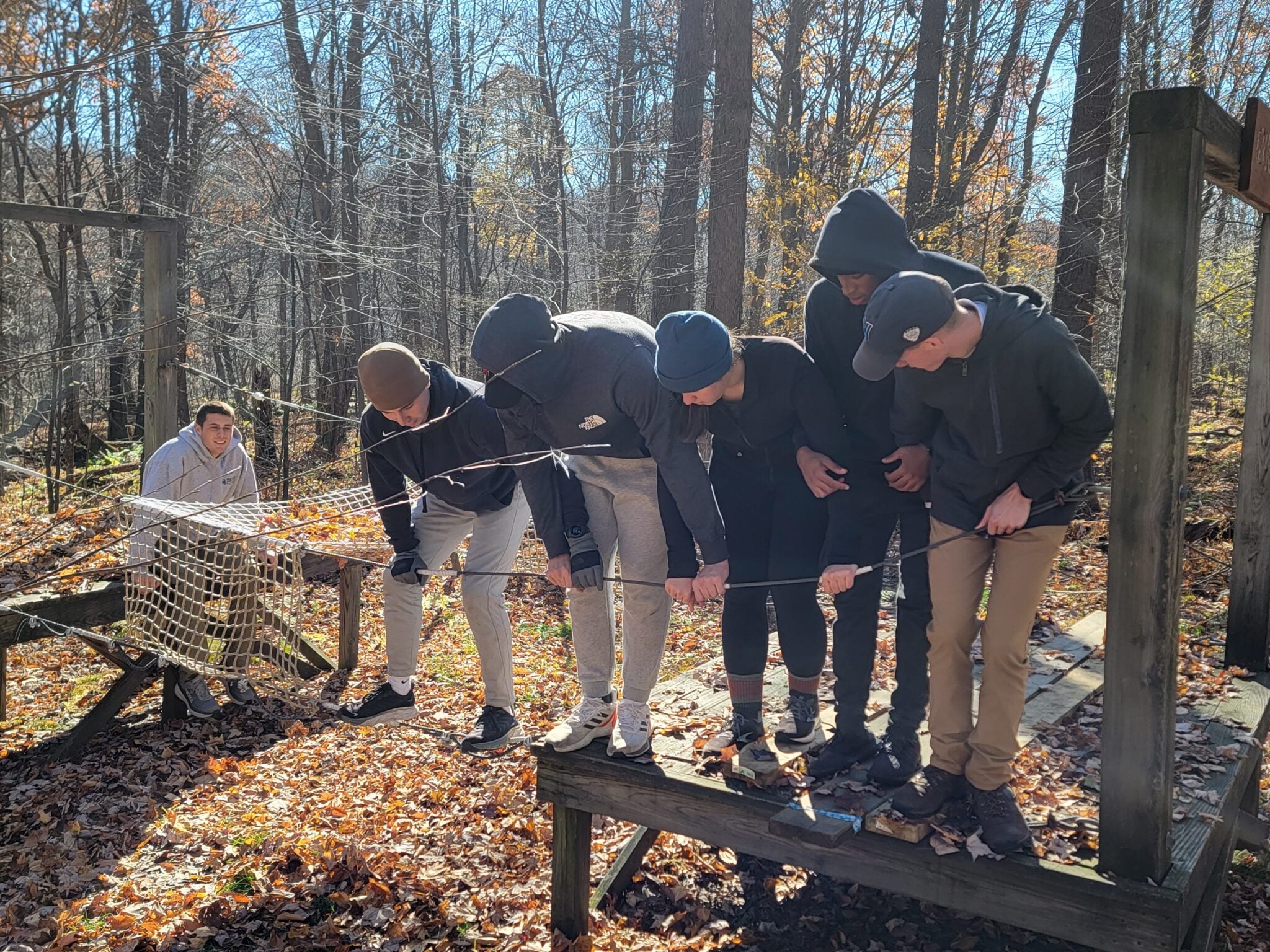
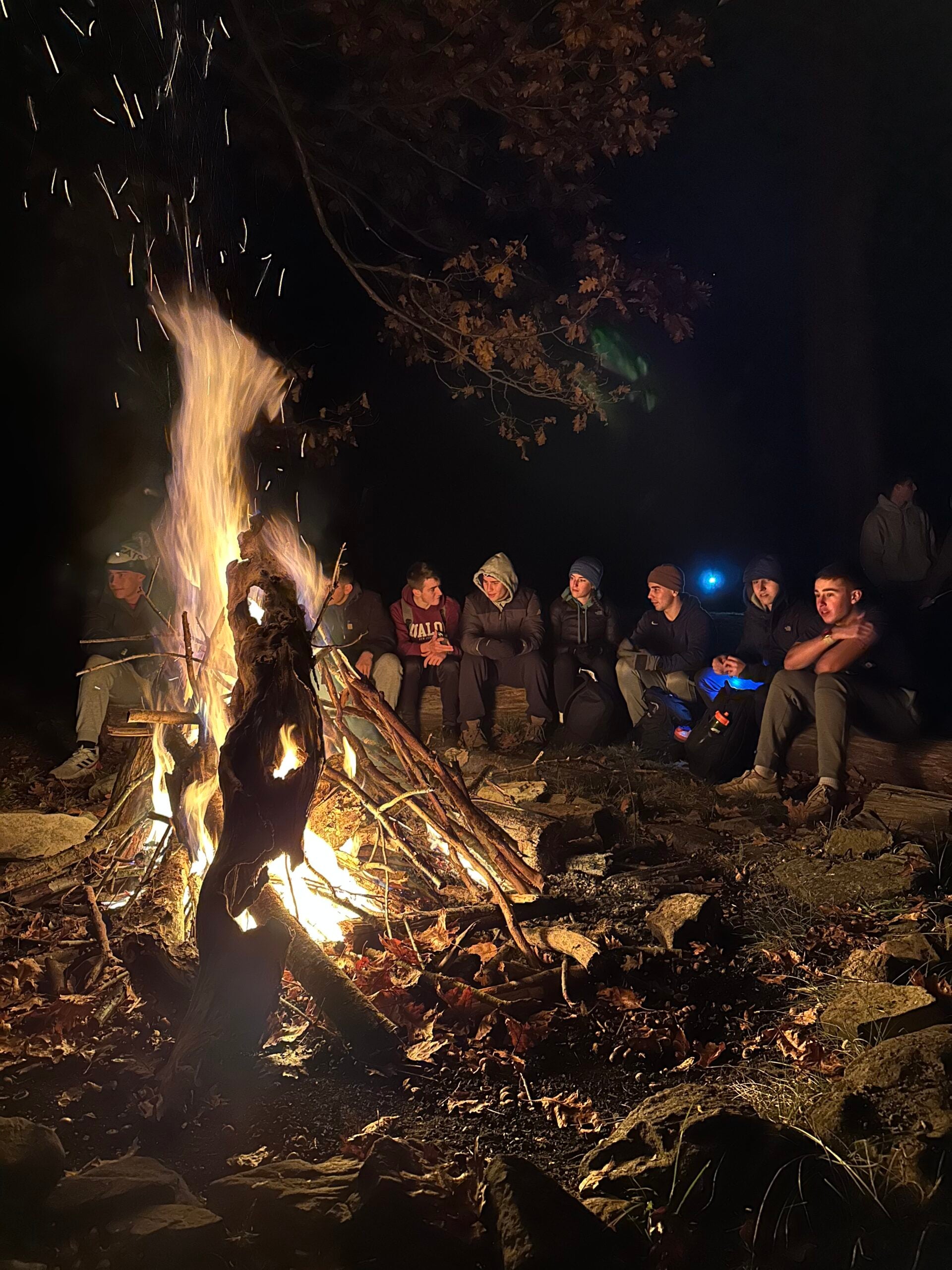
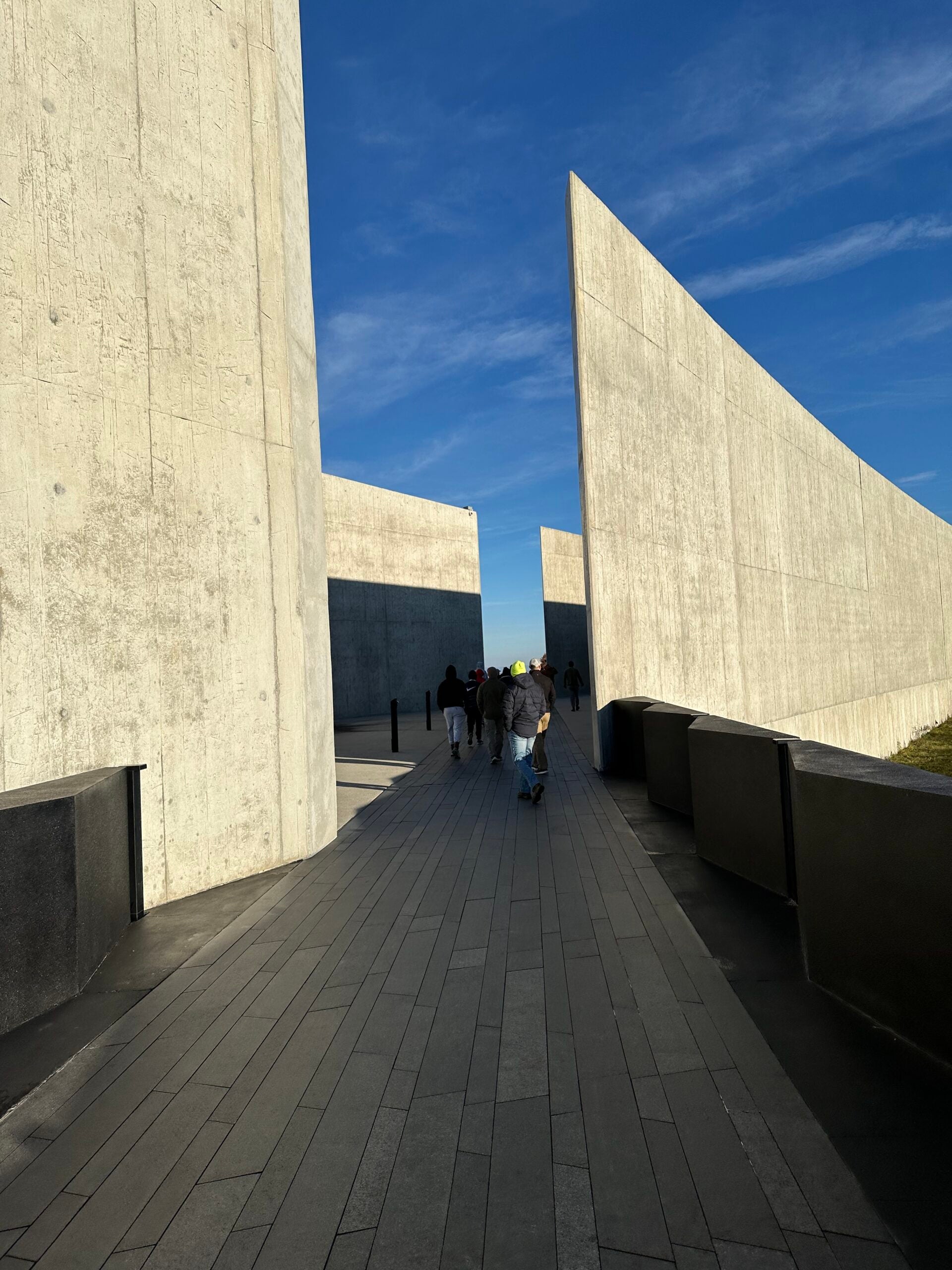
During Outdoor Odyssey the experiences in which I felt I learned the most about leadership were the obstacles which we went through in small groups. Our ability to work as a team progressed as we went along and faced more challenges. At first my group struggled in communication, and it felt more like an individual task. However, as we rotated the leadership positions, we learned the importance of hearing everyone’s ideas and, as the leader, taking all the best ideas your group had to offer into one plan. I learned that leadership is not simply delegating tasks but listening to your subordinates and bringing their different ideas into one solution.
Midshipman Foran on his experiences at Outdoor Odyssey
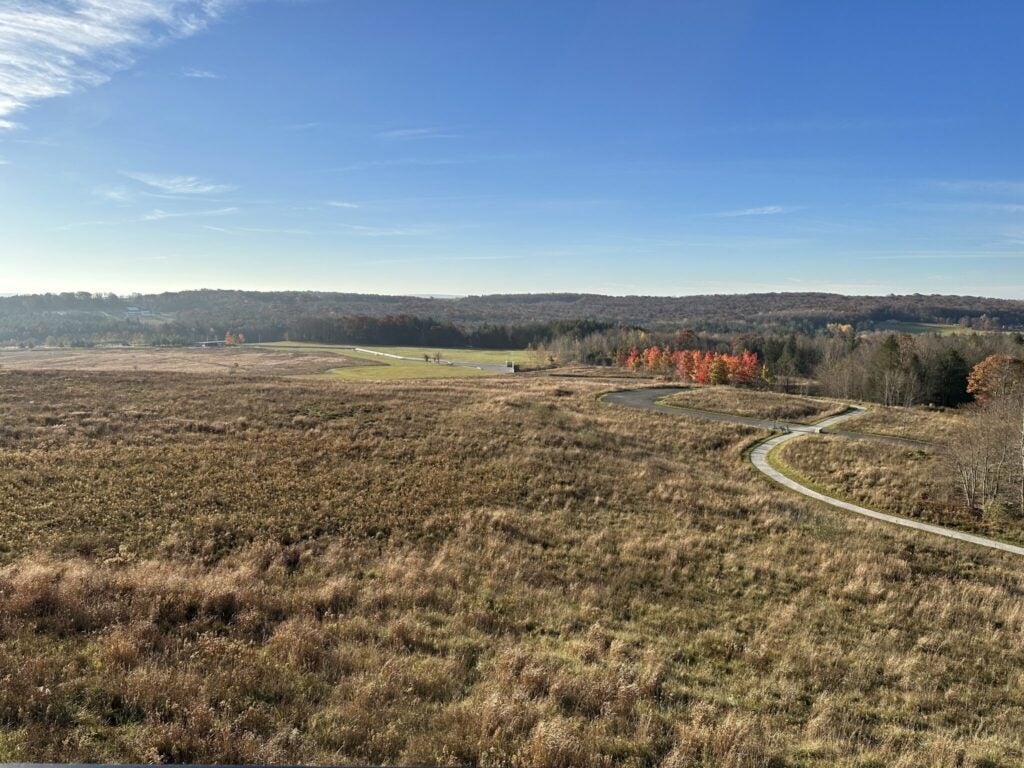
Article adapted from original story by 4th Class MIDN Pryor, edited by 4th Class MIDN Wang.
Pathways to Purposeful Careers: The Unique Narratives of Penn’s Career Advisors
As part of an ongoing effort to explore the people that make University Life a diverse community of educators and humans, I sat down with an ordained minister, a chicken expert, a geographer, an actor, and a podcaster.
What do they have in common?
Each of them works as part of the University of Pennsylvania’s Career Services team.
These five individuals joined the University Life strategic communications team to discuss their own unique career paths and all things career planning. Over takeout lunch from their favorite University City restaurant (Greek Lady), they chewed over the notion that each of their stories demonstrates that discovering a purposeful and meaningful career involves exploration, reflection, and ever-evolving pathways.
I was admittedly nervous about an hour-long lunch with five folks that I have never met. What would we talk about besides resumes and cover letters? What if it ironically seems like a job interview? We soon bonded over chicken tenders and how my preferred condiment was lovingly abbreviated as “honey must—” on our receipt.
Career Services is a storytelling genre. What connects resumes, interviews and networking is telling stories about oneself. It is why I was so interested in hearing the stories that brought an ordained minister, a chicken expert, a geographer, an actor, and a podcaster to the University of Pennsylvania.
“What I've appreciated about our office is really, that every person working in it doesn't have to have the same cookie cutter background,” Senior Associate Director Dr. Sharon Fleshman said. “There's this interesting thing about different people and what they bring.”
Dr. Fleshman’s words could not be truer; I was about to learn about each of their authentic selves and their own, unique career trajectories.
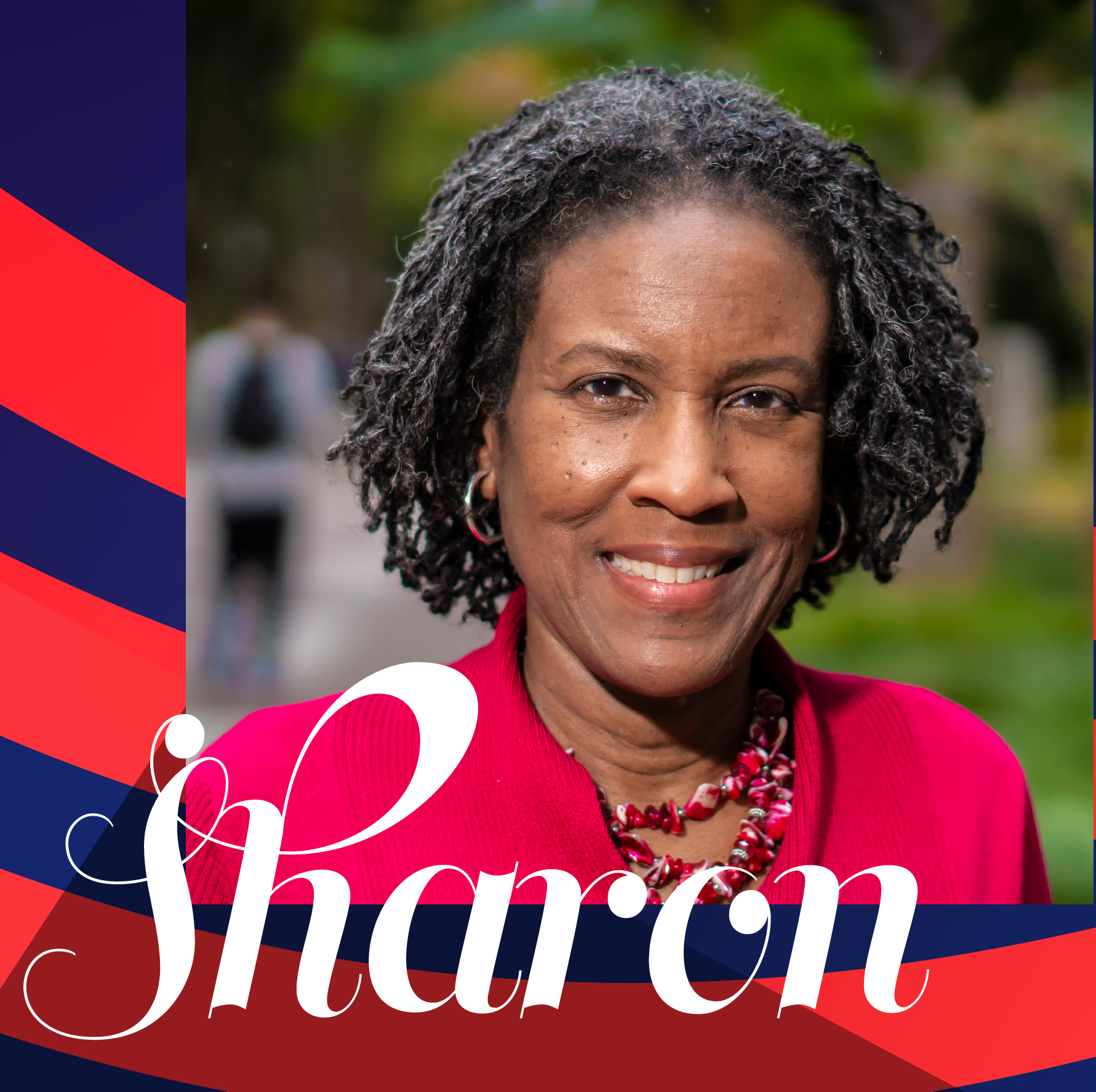
Dr. Sharon Fleshman
she/her
Senior Associate Director
Dr. Sharon Fleshman has been a stalwart at Career Services since the turn of the century. In her role, Sharon provides career advice to students in three schools: the School of Nursing, the Graduate School of Education, and the School of Social Policy and Practice.
Sharon empowers students seeking social impact careers to define their own paths by discovering and articulating their skills, strengths, and work values. Reflecting on her own experience, Sharon graduated from the University of Pennsylvania with a bachelor’s degree in Computer Science. She continued her education with master’s degrees from New York University’s Stern School of Business and Westminster Theological Seminary, and a Doctor of Ministry degree from Northern Seminary in Illinois. Dr. Fleshman is an ordained minister who emphasizes spirituality, vocation, and social justice in her sermons and ministry.
When she graduated from Penn, Sharon never thought that she would be working at her alma mater. She began her professional career in consulting but, in retrospect, found it isolating. From there, she ended up working in the nonprofit industry, trying to discover what fit well with her interests. With her career taking some “interesting turns,” she thought to herself, ‘Why not Career Services’?
“I always felt like the irony was that I never really used Career Services as a Penn student except for submitting resumes for on-campus recruiting.”
Sharon’s journey at Penn started at the School of Engineering and Applied Sciences. Being an African American, female-identifying student in the male-dominated field of STEM forged Sharon’s philosophical approach to social equity and wellness. She is passionate about the work and leverages her role in Career Services to lean into helping first-generation students of color navigate the stress of an Ivy League education. Sharon’s passion for her work also extends beyond the walls of Career Services and into the Penn community where she serves as the co-chair of the JEDI (Justice, Equity, Diversity, Inclusion) Committee.
Her experience as an ordained minister has honed her listening skills, especially when advising students and teaching them to mine their own stories to discover their passions. She loves helping students understand their sphere of influence and impact, giving them the confidence to share their story with a future employer. Sharon emphasizes the importance of “giving students permission to share stories that highlight their strengths and impact.”
With her work expanding across three different schools, Sharon champions an underlying, collective focus on social impact. Since the death of George Floyd sparked a nationwide discussion on diversity, equity, and inclusion issues, there has been a need to help students navigate its impact in the career field, discovering whether employers are committed to social justice in the workplace.
Twenty-two years after joining Career Services, Sharon is still passionate about helping students make career connections and discovering socially impactful careers. “Social impact can come from any career field. You can still have your values whether you are working in finance or social work. How do you align those with your career?”
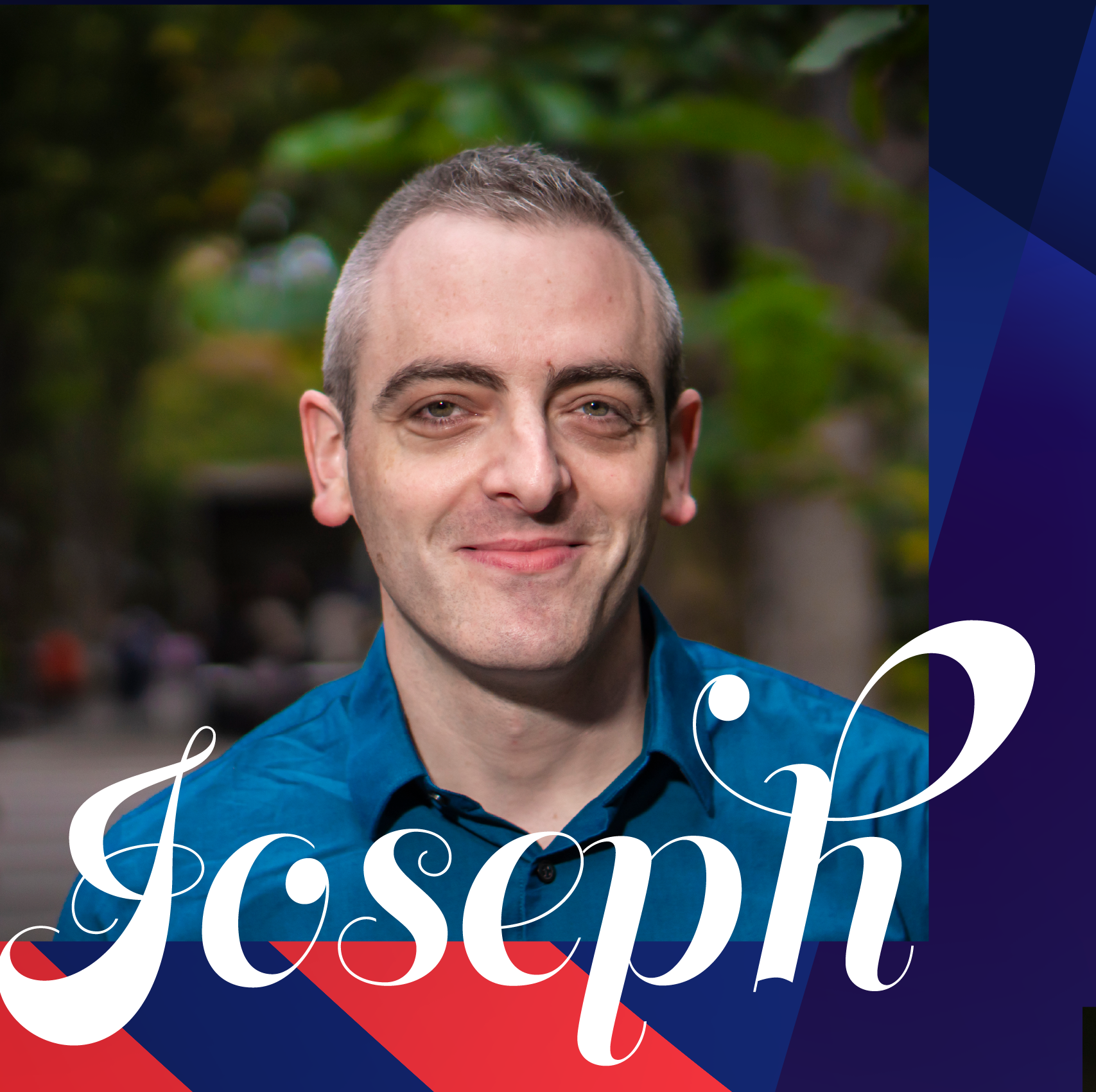
Dr. Joseph Barber
he/him
Director, Graduate Career Initiatives
Every path of Dr. Joseph Barber’s career has had a creative bent, whether that is researching chicken behavior or advising Penn graduate students.
Joseph presides over the newly formed position of Director of Graduate Career Initiatives. He oversees two teams that work with graduate and postdoc students. “It’s an emerging and evolving position whereby we’re trying to be more efficient with bigger picture, scalable, exciting initiatives.”
Oddly enough, Joseph’s creative journey began researching animal behavior as a doctorate student at University of Oxford in the United Kingdom. Delving into statistics was not exactly his cup of tea, but Joseph did love the process of thinking of new and interesting research questions about chickens. And writing engaging, funny titles. As he was submitting an article to be published in a journal, one of the anonymous reviewers told him that his title — Queues at the Canteen: Why Do Chickens Get Together When They Eat — had to be dialed back. It turned him away from the world of formal scientific publishing forever.
He eventually edited and co-authored a book on chickens. Analyzing the evolution and behavior of modern fowl, The Chicken: A Natural History explores the evolution of the domesticated chicken and provides a comprehensive, illustrated guide to understanding how chickens live, think, and act both alongside people and independently.
Not wanting to be the chicken expert forever, Joseph found a position that valued his research and his English accent in the United States. He worked as a Research Fellow at Disney’s Animal Kingdom in Orlando. After a consulting role completed during the Recession, Barber found himself reimagining his career once again.
At Penn, he found a role in Career Services that checked all the boxes: providing him access to literature to assist his research, allowing him to teach animal behavior as an adjunct at Hunter College, and welcomed his sense of humor. Joseph found a career that leveraged his STEM background that understood the graduate population and the challenges they experience.
“Every day requires me to be creative. It requires me to see the world through other people’s eyes, which is exactly what an animal behaviorist does, but within other species. It requires me to find ways to get information across and communicate effectively.
“Anything that I do here connects with what I enjoy doing most — creativity.”
His ability to find new doors and windows in his career enables Barber to instill optimism in his students. By nature, doctoral studies can feel very isolated. From his own personal experience, Joseph said that the challenge with academia is that there is not a lot of positive reinforcement. Whether it is the competitiveness of publishing or demands of funding, critical feedback is in the forefront, and rarely is there someone telling students they are doing a fabulous job or complimenting their skills.
Joseph strings together the evolutionary thread that connects chickens with graduate students.
“In the world of animal behavior, people do more of the things they are positively reinforced to do. If there is no positive reinforcement (or transferrable professional skills), people will lose the ability to see all the skills they have. By providing optimism to teach students that they do have skills and versatility, they are in a much better position no matter what career they pursue. It is 125% of what we do at Career Services.”
Every year is like an Etch-a-Sketch. There is a whole new set of students that come in with the same wonder, awe, uncertainty, and doubt. His job is to reinforce positivity, teach versatility, and support their career explorations.
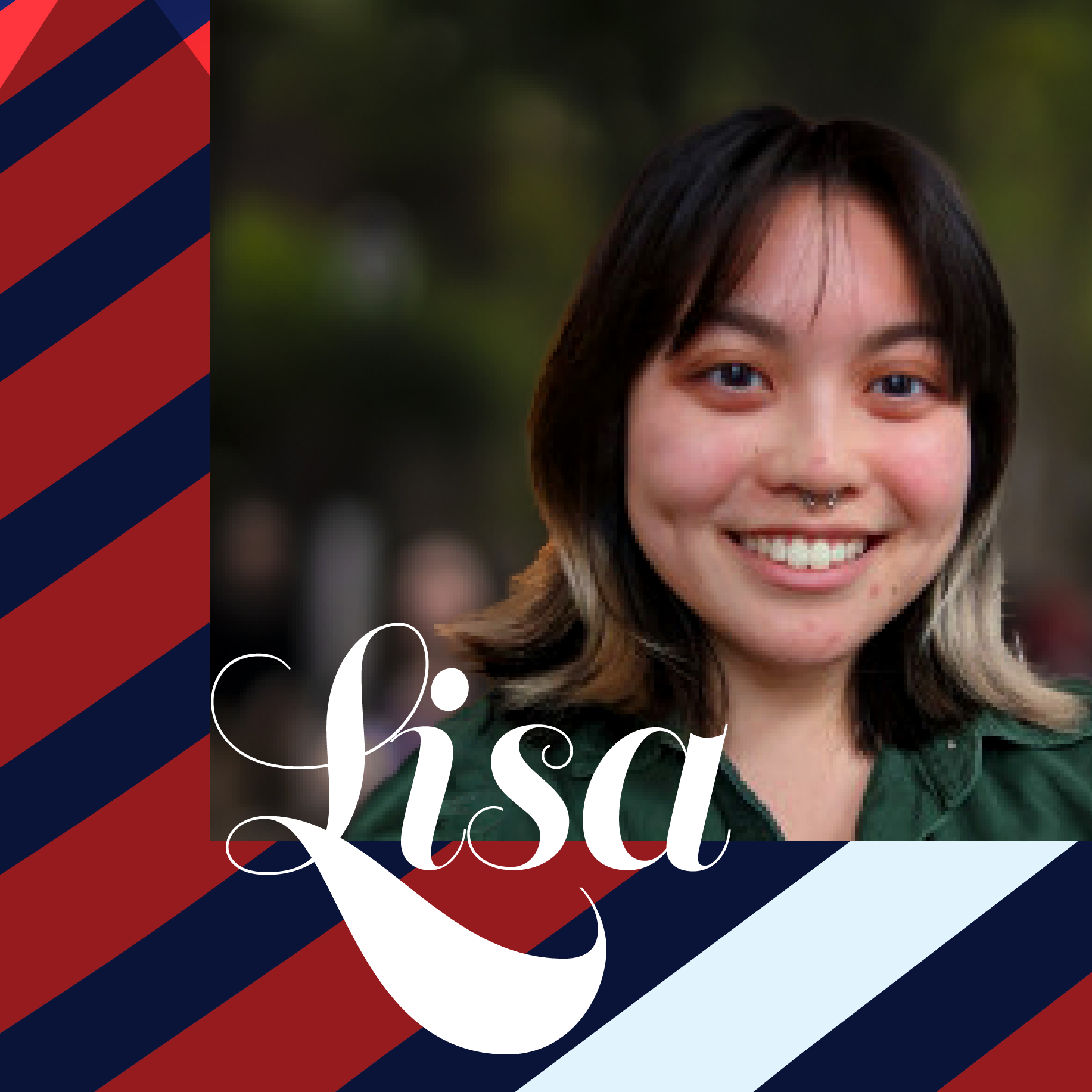
Lisa Giang
she/them
Administrative Coordinator
Like many young college graduates, Lisa found herself in the throes of a pandemic-stricken job market. Lisa joined Career Services in January 2022, and it was their fourth job in less than 18 months.
“I exemplify what career trends look like during the pandemic. I did not stay a year at a single job. There was a lot of uncertainty. Even if COVID had not happened the year I graduated, I still would not have known where I was going to end or what I was going to do.”
As an Administrative Coordinator, Lisa works in a joint role that supports graduate and postdoc students, as well as the nursing, education, and social policy programs. Lisa does a lot of the work behind the scenes, providing much of the support behind advising appointments and collaborating with the data and resources team to create the First Destination Survey (FDS); providing a snapshot of post-graduation employment and continuing education outcomes.
She found her niche in Career Services after thinking outside of the box and exploring jobs that utilized her skill sets and interests but did not align with the traditional trajectory of her major. After receiving her bachelor’s degree in Geography and Urban Studies from Temple University, Lisa moved to a career as a GIS Analyst. It was technical work using programming that they learned in their undergraduate studies. Lisa soon realized that fully remote and technical work did not give her inspiration.
“I needed something where I could be creative when I want to be. I wanted something where I could collaborate with people more frequently than when I was in my home cubicle office.”
She leveraged her technical background and was drawn to the data aspects of the role.
As a young adult, Lisa can relate to college students’ hesitancies about taking advice from a more established career advisor. Giang’s experience as a young person that has lived through post-pandemic employment shifts offers them a perspective that is valuable in the Career Services office.
“In a way, COVID offered what felt like narrowed opportunities. It felt like it changed the way people conceptualize work and how it interacts with their personal lives.”
At Temple, Lisa had internships in a variety of nonprofits including education programs and refugee resettlement services. She hopes to use these experiences to help support Penn students explore their future professions.
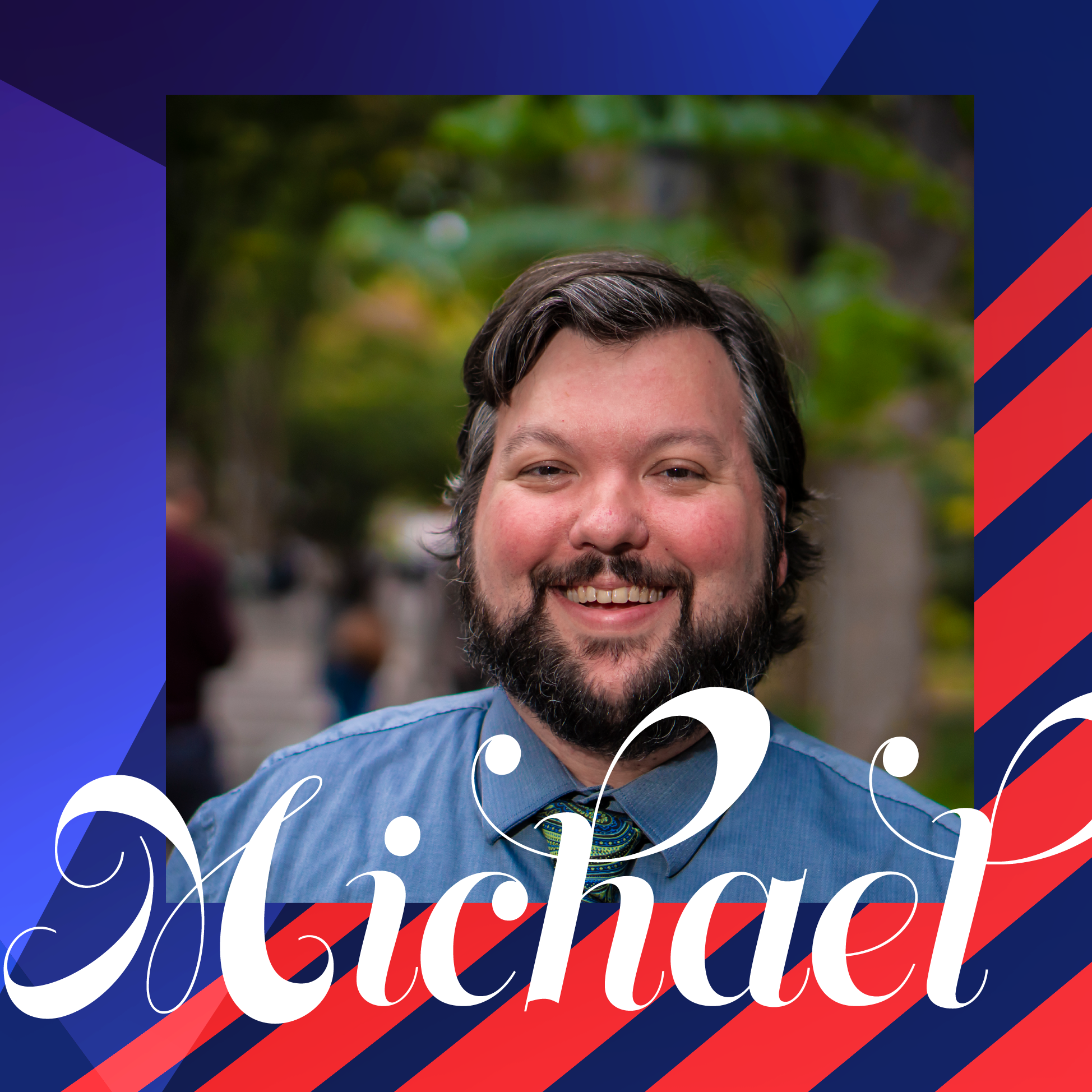
J. Michael DeAngelis
he/him
Senior Digital Resources Manager
Michael DeAngelis famously quit during his first interview at the University of Pennsylvania.
His path to Career Services ironically began out of desperation for employment. Shortly after graduating with a bachelor’s degree in Theatre Arts from Muhlenberg College, Michael moved to New York City three days prior to the attacks on the World Trade Center. It was a tough time to pursue a theater administration career on Broadway, and he left for Philadelphia, his hometown, a year later. A job at a theater company did not last, and a job at a video store inside of a mall left him feeling miserable and unfulfilled.
Michael had several Penn connections. His mother worked at the Penn Children’s Center, and his father is an alumnus of the Graduate School of Education. Michael was auditing classes in the theater department and realized that he enjoyed being on campus. In his second interview at Career Services, he was asked a hypothetical question about what would happen if he was ever offered his ideal theater job.
“Without hesitation, I said I would quit. In my head, I am screaming, ‘what are you doing?’ But I could not pass on my dream job. I left thinking that I had talked myself out of a job.”
As soon as Michael left the room, the former Director of Career Services told her staff to hire him because you cannot beat an honest person.
“I very quickly found that it was a place that was going to let me use my other interests and talents, and it could help me grow in other ways.”
In his role as Senior Digital Resources Manager, Michael helps Career Services embrace technology to keep pace with an industry that was progressively evolving from an analog to a digital space. He focuses on technology, communication, and innovation within the department. He learned coding, blogging, and eventually podcasting. Eighteen years and three positions later, he is fortunate that he is allowed to experiment and try unusual ways to connect with students.
“It is an office that embraces creativity. That is not why I came to the job. That is what kept me in the job.”
Michael continues to expand his creative passions as a professional podcaster, actor, director, and playwright, noting that he could not replicate that success without the stability and support he received at Penn Career Services. He serves as the managing director of The Porch Room film and theater company, and he wrote several plays that have received award recognition. He produced two plays Off and Off-Off Broadway.
DeAngelis integrated his theater skills into Career Services as a method of preparing students for mock interviews. While assessing Rhodes Scholarship applicants, he discovered that applicants sometimes lacked the ability to articulate their skills through an engaging narrative. Drawing on his performing arts background, he developed a program for using improv techniques for preparing for an interview.
“It is all about getting out of your head, not overthinking things, just being in the moment. There are no questions to which there is a right or wrong answer. They just want to know you. If you say your favorite movie is Star Wars, so much that you can talk about it for three minutes, it is okay.”
Michael is also the co-creator, writer, and producer of the podcast comedy Mission: Rejected. He co-hosts CS Radio, the official podcast of University of Pennsylvania Career Services.
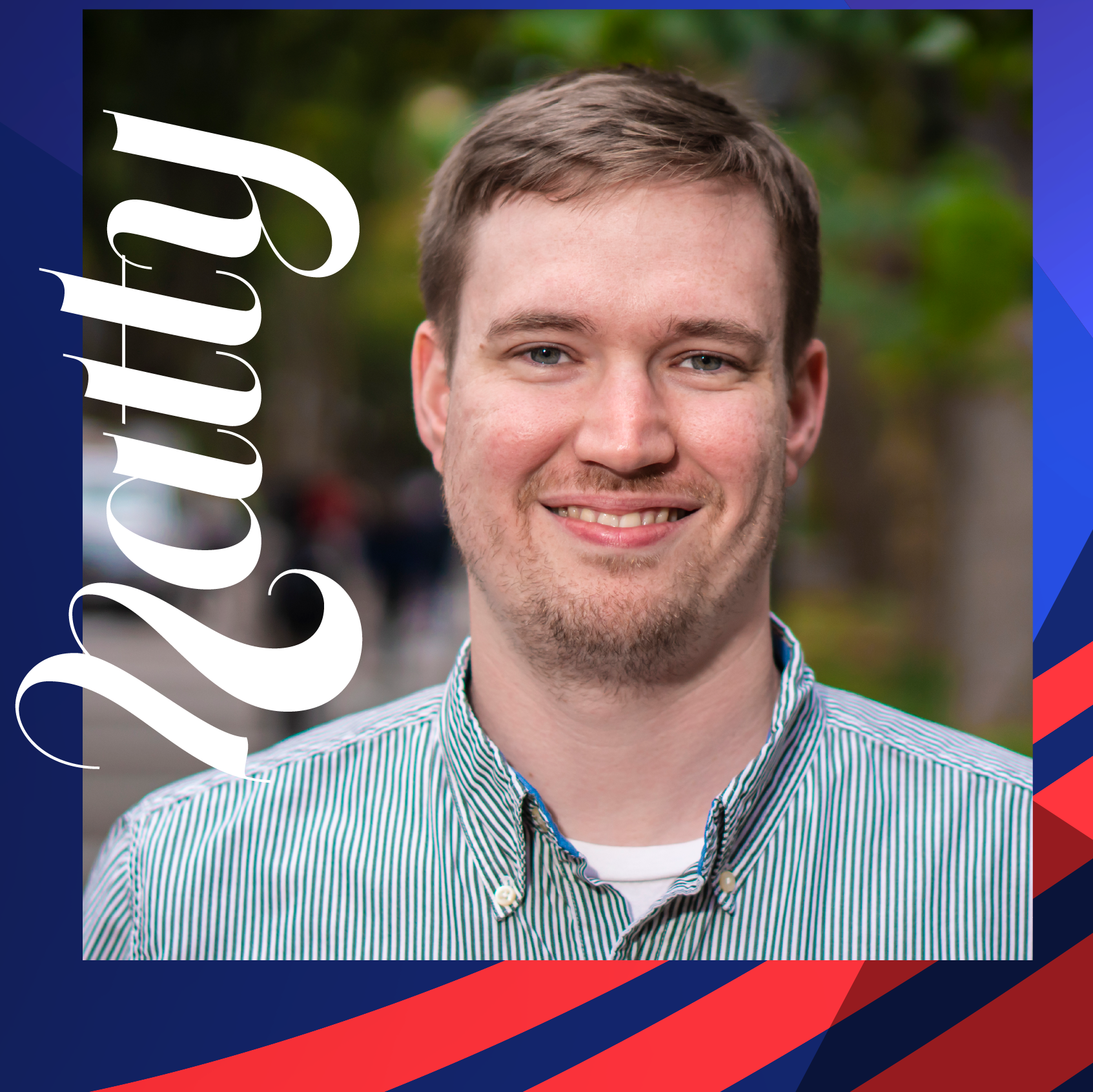
Natty Leach
he/him
Senior Associate Director
Like so many others in his department, Natty fell into Career Services as a ‘happy accident.’ He was a Resident Assistant as an undergraduate student at New York University. After receiving his bachelor’s degree in Media, Culture, and Communication, he realized that a career in higher education appealed to him. He worked at Temple University as a Pre-Health Advisor during his graduate studies in Educational Leadership. Even though he did not have any interest in the health profession, Leach thought of it as a chance to be creative and welcomed the learning curve.
Natty recently moved to a Senior Associate Director position with Wharton undergraduate students after working with the College of Arts & Sciences since 2017.
Career advising allowed him to find connections. He enjoys looking at different careers, job descriptions, and students’ backgrounds, and seeing how the pieces fit together.
Introspectively, that is how Natty sees himself. He tried to find a throughline to what connects his interests outside of work. He is an avid guitarist and gamer.
“Both interests help me feel adaptable and find connections in disparate ways. I can make a strategy out of something that might be harder to connect with.”
Last year, Natty utilized his creative talents and took over co-hosting duties of CS Radio, the official podcast of University of Pennsylvania Career Services. Leach joins Senior Digital Resources Manager J. Michael DeAngelis to have deep and rich conversations about career planning on a weekly basis.
For their 100th and 101st episodes, Natty and Michael intersected tabletop gaming and case interviews. They conducted a short Dungeons and Dragons session with three Career Services counselors and several gamers. The hosts figured the thought processes were similar enough that the counselors can absorb the information from the players’ characters and work out a solution.
Podcasts are another element of Career Services humanizing its office and allowing students to see opportunities in different lights.
“We have seen so much that students value transparency in everything, especially with DEI initiatives. It is making sure that employers really value what they say they value, but also where they can find a human element. I see our podcast as an extension of that. Those types of things in our office are where we can be humans and just talk and have fun. Even if we are having conversations that are broadly related to career services.”
Whether it is a podcaster, guitarist, or a gamer, Leach loves to talk to students and let them think through their own stories and who they are. An important interview skill is having the confidence to be able to bring any question, however philosophical or vague, back to the root of their authentic self.
“You’re always going to be successful answering a question if you’re able to ground it in an example of who you are, what you’re bringing to the team and work environment.”
